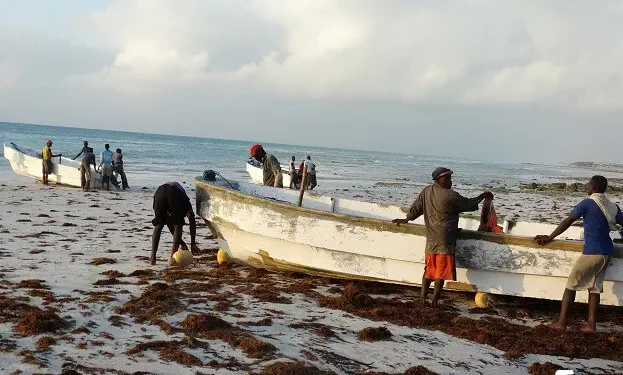
(ERGO) – In the small fishing village of Gumbah on Somalia’s northeastern coastline, economic activity has almost come to a standstill because of violent attacks being carried out against local fishermen and their boats by foreign trawler crews.
Mohamed Said Nur, 42, who has earned a living for his family as an independent fisherman in Gumbah village for 17 years, has finally quit and moved to Bosaso to take a job with a fish exporting company.
He says his boat and fishing nets were stolen from the sea at night while they slept. He had bought the equipment on credit and was still trying to pay off the loan.
“I have stopped working in fishing because of the huge debts I have. I used to earn my living from the ocean but I lost all my equipment to the [foreign attacking] trawlers. It was worth $1,800 and I haven’t repaid the loan,” Mohamed said.
Since September, he has been making do on the $300 a month he earns at the company in Bosaso. He moved his family to live with him in Wardher village in Bosaso to curb their expenses. She sells samosas and fast foods to school children earning $5-6 a day to help pay school fees for six of their children and contribute to the $140 rent for their two-room house.
It’s a far cry from the $500-600 a month he used to make from selling the fish he caught with his own boat. Sometimes he has to takes loans to buy food for his children at the end of the month and his debts at local stores stands at $240.
“There is a huge difference between this job and the previous one. This job just covers the bills,” he said.
There were once 300 active local fishermen in Gumbah, according to the local fishermen’s association, but almost all of them have now quit and left the area in search of other jobs or livelihoods. Only a few people remain fishing just for food, leaving the village depleted and stagnant.
Another Gumbah native, Mohamud Abdullahi Ali, 40, moved away from the village to take a job in Garowe as a security guard, earning $140 to support his family of a wife and seven children.
He migrated away from the coastal village in eastern Bari region last March. The final blow for him was when he and his two co-fishermen were attacked by a foreign trawler crew and robbed of their equipment out at sea.
They used to catch crabs and sharks to sell in Bosaso, making a daily profit of $15. He says it’s been a struggle for him to adapt to work as a guard, but with no other plans for earning a living he had to settle for this new low-paying job.
“The situation forces you especially if you have young children, so you just have to get through everything especially for your children,” he said.
Mohamud believes that he may never find better work than his previous work as a fisherman, as jobs in the city don’t offer a sustainable income.
“I earn $10 a day, and I have to use it to take care of my family. We don’t get any other benefits,” he said.
Still, he is glad to be making a living for his family even though their income has been slashed. He is saving $20 a month hoping to buy new fishing equipment and return to his village to start fishing again in future.
The chairman of the fishermen’s association in Gumbah, Said Muse Yusuf, said hundreds of fishermen had abandoned their livelihoods after having their equipment stolen or destroyed by foreign trawler crews.
The effects of unregulated foreign vessels and these wanton criminal attacks on local fishing crews are felt across the region, where fish is the main source of living for many people.
He commended his fellow fishermen for seeking job opportunities in different areas and supporting their families despite their losses.
Although the fishing sector has been struggling for some time, 2023 was the worst for fishermen in Bari region, according to Said, due to the insecurity caused by the foreign trawlers.
Source: Radio Ergo

Leave a Reply